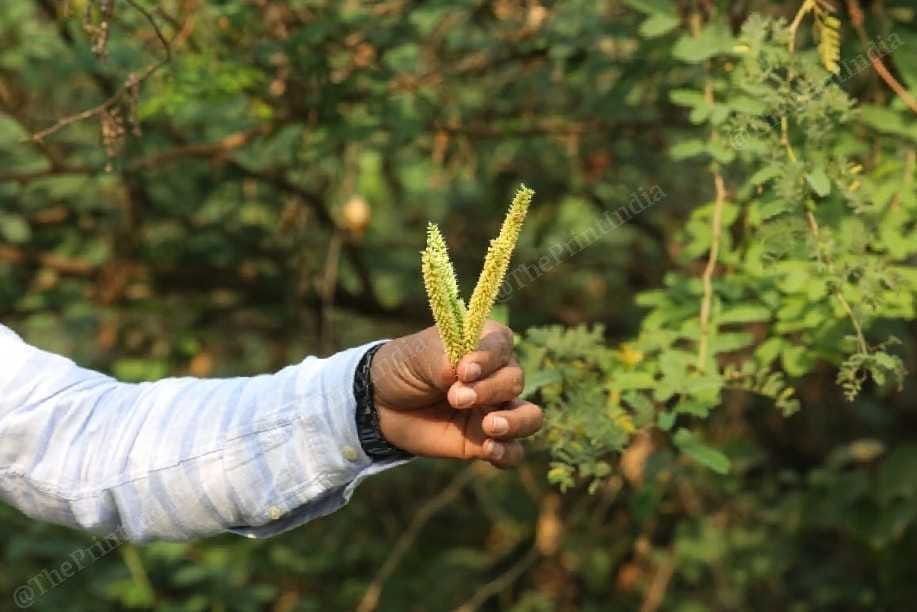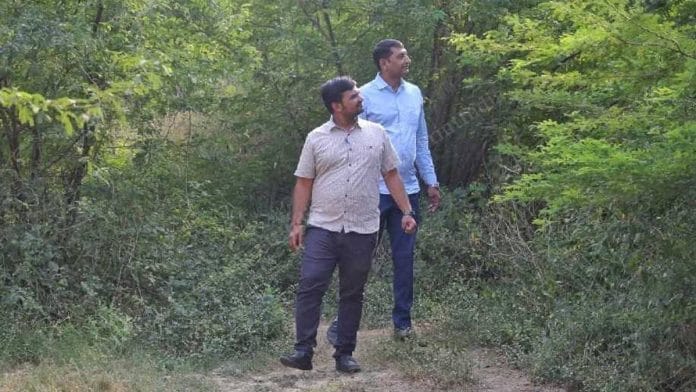Daskroi (Gujarat): Prosopis juliflora, a thorny shrub native to places like Mexico and parts of South America, is the foreign angle in the BJP campaign for the ongoing Gujarat assembly elections, dominated by words and issues like the Ram temple in Ayodhya, references to Pakistan, Bangladesh, the Rohingya refugees, balidaan, yug purush (PM Narendra Modi), and the Bilkis Bano gang rape and murder case dating back to the 2002 riots.
The shrub is so widely hated — as an oversized weed — that BJP leaders are using it as an analogy for what they want people to see as being wrong with the Congress. This is because the popular consensus in Gujarat is that the Prosopis juliflora was brought to the state by the then Congress government here in the early ’60s.
Their idea then was sincere, to bring this fast growing, hardy tree to stop the spread of the Kutch desert, it is said. Over time however, the tree grew so fast and so invasively that it became a nuisance, said government officers.
And so Prosopis juliflora, locally called Gando Bavad (and pronounced as Gando Baavad, meaning mad tree), is now being used by senior BJP leaders to take a potshot at the Congress. The party in power in the state has been referring to the plant as a ‘virus’ and a ‘pardeshi bavad’ (foreign tree)’ imported by the Congress to destroy Gujarat’s swadeshi kheti (agriculture).
Parshottam Rupala, union minister and senior BJP leader, has used the analogy of the Mexican plant repeatedly to hit out at the rival party. Ahead of last year’s civic body elections in the state, Rupala had said that the Congress should be uprooted in the same way the plant is.
Addressing a rally Wednesday, Rupala said, “They (Congress ) don’t do much on the ground yet keep claiming ‘kaam bole che (work speaks)‘. While doing rallies I often sit and think if they have done anything for the state or its people. I came to this one conclusion, they brought the foreign acacia trees to the state. Why should I lie or hide? Every time I see an acacia tree in a village or city, I see the ‘kaam (work)’ they have done.”
Commenting on Congress campaign 'Kaam bole chhe', Union Minister Parshottam Rupala today said Prosopis juliflora(Gaando Baaval) is one work by Congress, visible in every village. (The Then Congress govt in 1960s had began to introduce Gando Baval from South America in Gujarat). pic.twitter.com/1CjsSbOaa1
— DeshGujarat (@DeshGujarat) November 30, 2022
He added: “For all those party workers and city dwellers who have taken their cars to the rural areas and have had tree sap falling on their cars, you are witnessing Congress’ work in the state. Our elders have always advised against growing this crazy tree. Now we have to pay for the removal of these trees. Our friends from Congress will not understand why we call it crazy.”
Referring to the plant’s tendency to proliferate and regrow even when cut down, Rupala said, “The reason why we never wanted this crazy tree is because even when you cut it down it grows back. Villagers have advised me to ram it down with a JCB and completely unroot it to stop its regrowth. It is the only way to kill it completely.”
The BJP leader then appealed to voters to do the same to the Congress.
“Similarly, this time around don’t try to superficially cut the Congress, vote for the BJP in big numbers and ram the JCB so that the party is removed from its roots like the tree,” he said.
The Congress has, however, dismissed BJP allegations of their being responsible for the fast-growing foreign plant’s impact on agricultural land in the state, pointing instead to the fact that it is the BJP which has been in power in the state for the past 27 years, since 1995.
“This is nothing but a maligning campaign they are running against the Congress to mislead people. They know that we have done well in the first phase (of the elections) and that is why they are now shifting goal posts,” said Alok Sharma, senior Congress leader and state spokesperson.
Polling for the first phase of the 2022 Gujarat assembly elections took place on 1 December, with second phase voting scheduled for 5 December. Results are to be announced on 8 December.
Also read: Godhra a battle of ‘prestige’ for RSS-BJP. Bilkis Bano convicts, 2002, Ram Bhakts are key
‘Keep uprooting, keep growing’
According to official records, the Gujarat state forest department had initially exclusively planted Prosopis juliflora on about 31,550 hectares of land in the state in 1960-61, to check the advancement of the Rann of Kutch. Congress leader Jivraj Narayan Mehta was then the Chief Minister of the state.
According to people in the state, while the shrub has since spread across Gujarat, some areas are battling a more aggressive growth than others. One such place, according to them, is Daskroi in Ahmedabad district, which goes to poll in the second phase of the elections, Monday.
ThePrint travelled across villages in the district, hearing stories of how the shrub had taken over farm lands and the money being spent to remove them.

According to Vishal Bhai Patel, a farmer in Ode village of Daskroi, the shrub has taken over 50 per cent of his farmland and made it arid, uncultivable.
“I own 20 bighas of land, but the aggressive growth of Gando Bavad has turned half my land brazen. This particular shrub spreads its roots deep into the ground and dries up water. It naturally kills other plants or crops. And cutting of these shrubs makes it grow faster. So we end up spending thousands of rupees uprooting it by special machines,” said Patel.
Jaswant Singh, Sarpanch of the Ode Panchayat claimed every month the panchayat spends lakhs of money in hiring machines to weed out the shrubs.
“We keep uprooting it, but it keeps growing. The state’s irrigation department also has special JCBs for uprooting the plants along the canal, as it destroys biodiversity and dries up water. We have long been demanding a ban on this species,” said Singh.
A research paper titled Banni Grassland, An Overview, published in 2016 by Joystu Dutta, then assistant professor of environmental sciences at Sarguja University, stated “seeds (of Prosopis juliflora) would spread with the dung of livestock which fed on the pods of tree, and invaded low saline areas of Banni, on the southern edge of the Rann.
The paper referred to an Indian Space Research Organization estimate, which claimed the shrub is spreading in Gujarat at the rate of about 25 sq km per year. The paper also added that Prosopis posed a natural threat to the endemic flora and fauna owing to its high invasive abilities and that the plant’s pods are detrimental to the health of cows.
Senior BJP leaders refer to the shrubs as a “virus” imported by Congress to kill the “swadeshi kheti (domestic agriculture)”.
“We have Swadeshi Bavad growing, that is a local variety of the same shrub. It has smaller leaves. But the local variant has some utility. It is used as firewood and has some medicinal value too. But the South American or Mexican Variety, which the Congress government introduced here, is a dangerous species. It is killing the ecosystem and causing drought in the region. Rupala ji has spoken the truth,” said Babulal Patel, 72-year-old Daskroi MLA and BJP’s candidate here for this election.
Congress leaders, however, claimed the Congress party has nothing to do with such species and it was used on an experimental basis by the government at least 60 years ago.
“In the past 27 years, Congress did not come to power in Gujrat. BJP has been ruling the state since then. Why didn’t they uproot this species or bring some scientific solution to it?” asked Pankaj Patel, state vice president of Congress.
(Edited by Poulomi Banerjee)
Also read: In Gujarat’s tribal-dominated Dahod, RSS uses saving plans, loans to foil ‘conversions’, push BJP






